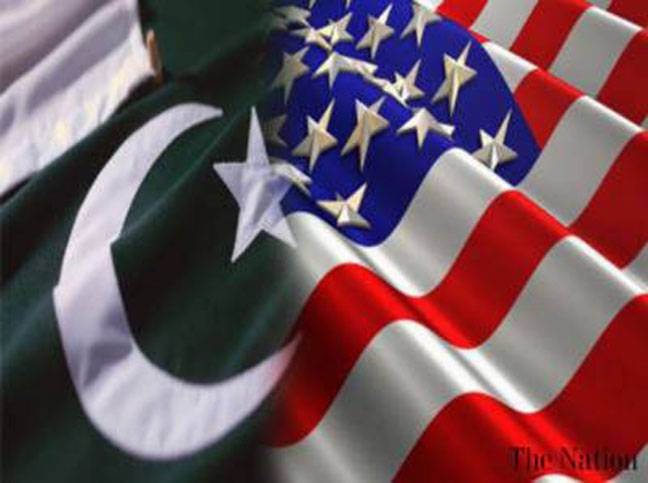ISLAMABAD - Pakistan Friday hit back at the United States as Islamabad issued a new travel permission regime for the American diplomats, restricting their movement and revoking undue facilities across the country.
A letter issued by the Ministry of Foreign Affairs to the embassy of the United States said the US diplomatic cargo at Pakistani airports and ports will be strictly treated in accordance with the provisions of Article 27 of the Vienna Convention on Diplomatic Relations, which does not provide an exemption from scanning.
The decision was taken reciprocating to travel permission regime introduced by the US government on Pakistani diplomats and officials, the foreign ministry said.
The letter says the rules governing interaction between Pakistan government officials and foreign diplomats, which were shared with the US embassy on April 27, will be strictly implemented.
The letter said the US embassy and consulates in Pakistan will no longer avail facilities of using tainted glass on official vehicles and rented transport, non-diplomatic number plates on official vehicles, diplomatic number plates on unspecified and rented vehicles; and the facility of biometrically unverified or unregistered cell phone SIMs.
It said the facilities of hiring or shifting of rented properties without prior no objection certificate and overshooting visa validity periods and having multiple passports will also not be available to the US diplomats forthwith.
According to BBC, the embassy will also have to seek no objection certificates from the ministry to install radio communication at residences and safe houses.
The letter says Pakistan had undertaken every possible action to address the issue of alleged harassment, including establishing a fast-track mechanism to address any future complaints.
The letter said the US embassy was apprised of the mechanism on April 27 and no incident had since been reported under the new mechanism. It said the Foreign Affairs Ministry was informed that the new travel permission regime was going to be implemented for Pakistani diplomats and officials in the United States from Friday, May 11.
Foreign Office Spokesperson Dr Mohammed Faisal had earlier said Pakistan and the US will impose restrictions on diplomats’ movement from May 11.
Dr Faisal said the restrictions will be implemented on a reciprocal basis. “However, negotiations are ongoing between the two sides, on the matter,” he added. Under the restrictions, the diplomats will have to seek permission for any movement behind a limit – probably outside 25-40 kilometres.
The tension comes as Washington approved Ali Jehangir’s appointment as the Pakistan ambassador to the US. Amid the strained ties, the Islamabad High Court ruled yesterday that US Defence and Air Attaché Colonel Emanual Joseph – who killed a Pakistani in an accident - did not have ‘absolute immunity.’ The court also granted two weeks to the interior ministry to decide over placing his name on the Exit Control List.
The Pak-US ties have been frosty for several months. In January, the US suspended security assistance to Pakistan targeting the Coalition Support Fund. State Department Spokesperson Heather Nauert said the US was suspending ‘security assistance only’ to Pakistan. She clarified that Pakistan will be able to receive the suspended funding if it took ‘decisive actions’ against the Haqqani Network and the Afghan Taliban.
Pakistan said it was not dependent on US aid for its war on terror. The foreign ministry said Pakistan had fought the war against terrorism largely from its own resources “which has cost over $120 billion in 15 years.”
Pakistan said the money it had received from the US was mainly reimbursements for supporting US-led coalition forces after they invaded Afghanistan in 2001.
Pakistan estimated receiving at least $1.5 billion under the CSF during 2017-18. The US only disbursed $550 million during the last fiscal year ending July despite committing $880 million.
US President Donald Trump claimed giving Pakistan $33 billion in aid. The US had sanctioned $33.4 billion for reimbursements to Pakistan during the past 15 years, 44 per cent of which was on account of anti-terror services.
The US says excluding $14.573 billion cost of logistics and aerial support, the approved civilian and security-related aid to Pakistan from 2002 to 2016 was only $18.8 billion.
Compared to the actual foreign aid of $18.8 billion, Pakistan says it sustained $123.13 billion losses on account of the war against terrorism since 9/11.
Washington’s economic leverage over Islamabad has significantly reduced since 2014, as it came down to $1.6 billion per annum against the average of $2.3 billion per annum between 2002 and 2013.
US Embassy Spokesperson Richard Snelsire said he could not comment on the new developments in Pak-US ties. “We have no comment at present,” he told The Nation.
Meanwhile, the US House Armed Services Committee has called for further cuts to US military aid provided to Pakistan until the country demonstrates a commitment to tackle the insurgency.
In his mark-up of the National Defence Authorisation Act for fiscal year 2019, the committee’s chairman Mac Thornberry said $350 million of the $700 million allocated to Pakistan under the CSF should be withheld.
Pakistan imposes new travel regime on US diplomats






